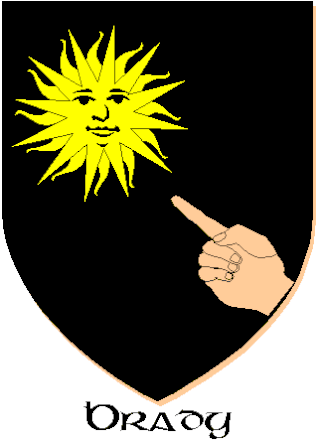See also
Surname list
This page lists people with the surname Cane. If an internal link intending to refer to a specific person led you to this page, you may wish to change that link by adding the person's given name(s) to the link.
Cane is a surname. Notable people with the surname include:

Brady is a surname derived from the Irish surname Ó Brádaigh or Mac Brádaigh, meaning "spirited; broad".
Pearse is a surname. Notable people with the name include:
Mason is an occupational surname of Scottish and English origin, with variations also found in Italian and French, historically referring to someone who performed stonemasonry work. The surname Mason was originally brought to England in the great wave of migration following the Norman Conquest of 1066. The name Mason is for a stone-mason. The name was originally derived from the Old English or Old French word masson. []
May is a surname of Germanic (Saxon) and, independently, of Gaelic origin. There are many variants used in English-speaking countries, as well as several variants used in Germany. The Scottish May is a sept of Clan Donald. The surname "May" remains a common surname in the United States, England, Scotland, Ireland, Canada, Germany, Australia and New Zealand, as well as among Russians of German origin; possibly also persisting in areas of the Netherlands and France.
Wilkinson is an English surname of Norman origin. It is a variant of Williamson, derived from a variant of William, Wilkin, brought to the Anglo-Scottish border during the Norman conquest. At the time of the British Census of 1881, the relative frequency of the surname Wilkinson was highest in Westmorland, followed by Yorkshire, County Durham, Lincolnshire, Cumberland, Northumberland, Lancashire, Cheshire and Nottinghamshire. People named Wilkinson include:
McDiarmid, also MacDiarmid, is an Irish surname originating from a high king of Ireland circa 657 AD, popular in Scotland.
Keating is an Irish and English family name.
The surname Burns has several origins. In some cases, it derived from the Middle English or Scots burn, and originated as a topographic name for an individual who lived by a stream. In other cases the surname is a variant form of the surname Burnhouse, which originated as a habitational name, derived from a place name made up of the word elements burn and house. In other cases the surname Burns originated as a nickname meaning "burn house". In other cases, the surname Burns is an Anglicised form of the Irish Ó Broin, which means "descendant of Bran". In some cases the surname Burns is an Americanized form of the Jewish surname Bernstein, which is derived from the German bernstein ("amber").
Kirby is a surname of Irish and English origin. The Irish surname is an anglicisation of Ó Ciarmhaic, while the English surname is from the Old Norse "kirkja" + "býr" meaning "church" + "settlement". Notable people with the surname include:
Lynn is a surname of Irish origin, English, Welsh or Scottish. It has a number of separate derivations:
Horne is a surname. Notable people with the surname include:
Lawson is often an English and Scottish surname that may sometimes also be a given name.
Humphreys is a common surname. Notable people with the surname include:
Potts is a surname of English origin. The word potts refers to circular hollows in the ground.
Hartley is a surname. Notable people with the surname include:
Coleman is a surname of Irish and English origin. The Irish surname is derived from the Irish Ó'Colmáin, Ó'Clumhain, or Mac Colmáin. The English surname is an occupational name denoting a burner of charcoal, or possibly a servant of a person named Cole.
Clarke is a surname which means "clerk". The surname is of English and Irish origin and comes from the Latin clericus. Variants include Clerk and Clark. Clarke is also uncommonly chosen as a given name.
Squires is a surname. Notable people with the surname include:
Major and Majors are surnames.
Quinn is an Anglicised form of the Irish Ó Coinn or Mac Cuinn. The latter surname means "descendant of Conn". The surname Quinn is also rendered Ó Cuinn or Mac Cuinn in Irish. The surname is borne by several unrelated families in Ireland, especially in the northern province of Ulster and also the counties of Clare, Longford, and Mayo. According to the historian C. Thomas Cairney, the O'Quins were part of the Conmaicne Rein tribe in Ireland who came from the Erainn tribe who were the second wave of Celts to settle in Ireland from about 500 and 100 BC. The most notable family of the name are that of Thomond, a Dalcassian sept, who derive their surname from Niall Ó Cuinn who was slain at the Battle of Clontarf in 1014. This family was formerly represented by the Earls of Dunraven. Another family is that seated in Annaly, who were related to the O'Farrell lords of Longford. Another Quinn family was seated at An Chraobh, County Tyrone and they were related to the O'Neill Kings of Tír Eoghain and for whom they acted as Hereditary Quartermasters. Other families include one seated in Antrim; one seated in Raphoe; and one called Clann Cuain, seated near Castlebar. In the seventeenth century, the surname Quinn was common in Waterford. In 1890, the surname was numerous in Dublin, Tyrone, Antrim, and Roscommon. Quinn is one of the twenty most common surnames in Ireland. the surname Quinn is sometimes associated with Catholics, while Quin is associated with Protestants.